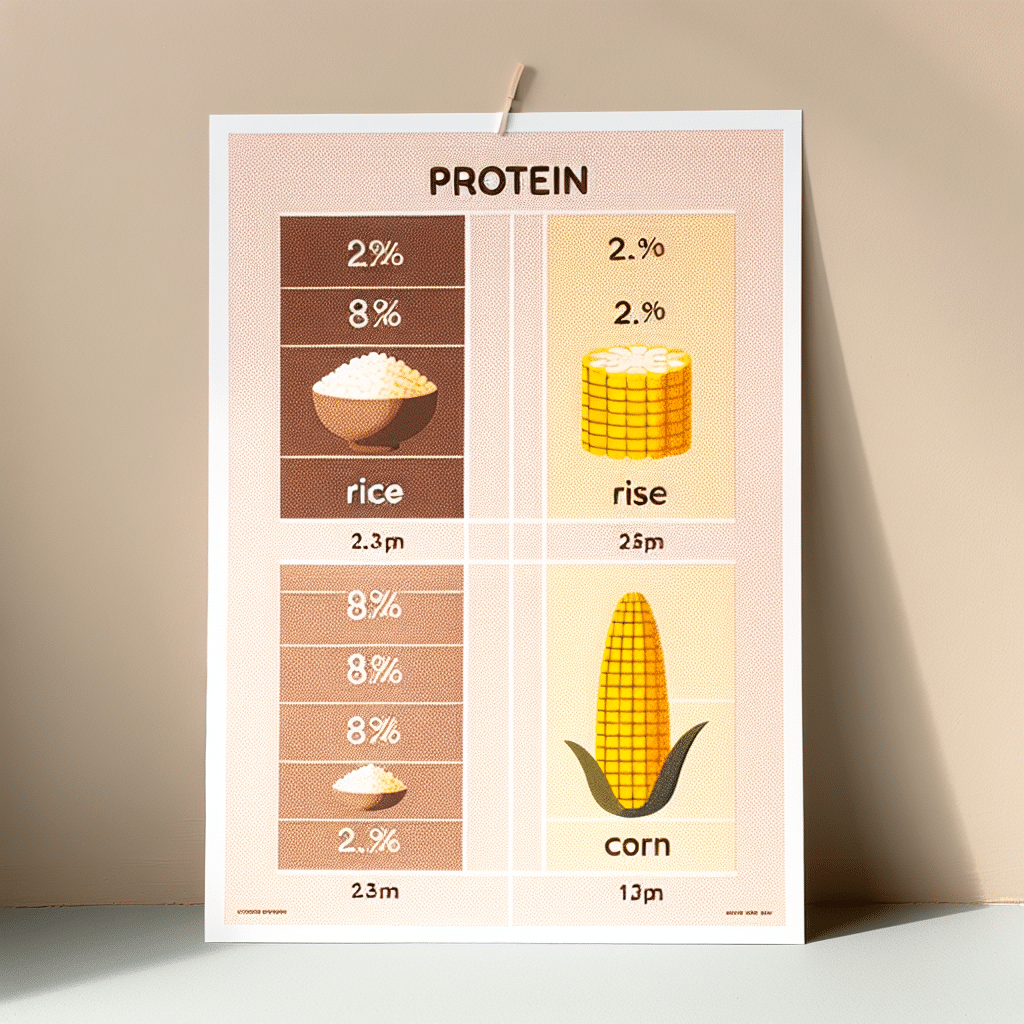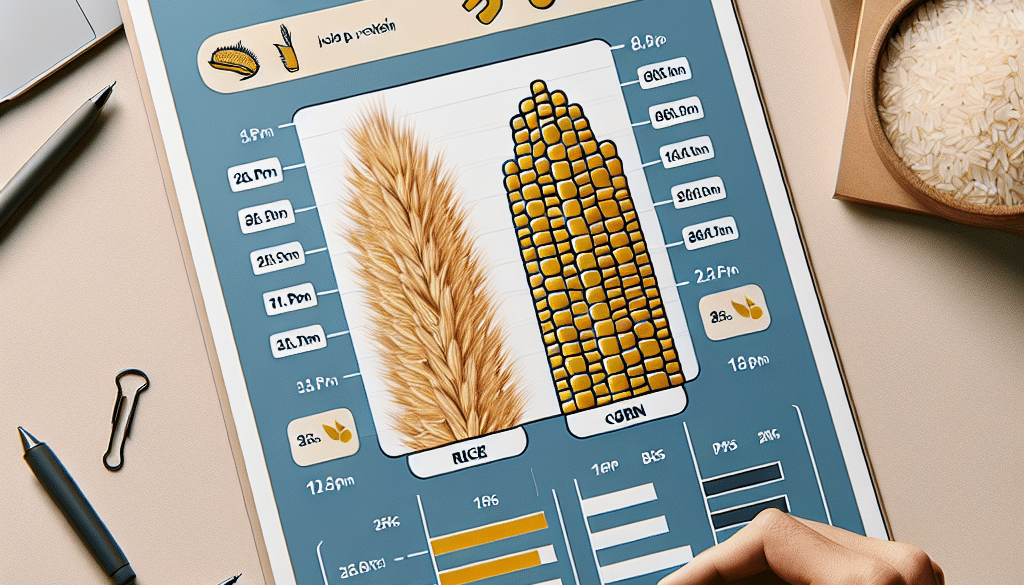Does Rice Or Corn Have More Protein?
-
Table of Contents
- Protein Content in Rice vs. Corn: A Comprehensive Analysis
- Understanding Protein in Grains
- Nutritional Profile of Rice
- Nutritional Profile of Corn
- Comparing Protein Content: Rice vs. Corn
- Factors Affecting Protein Quality and Absorption
- Protein in Rice and Corn: The Bigger Picture
- Case Studies and Statistics
- Conclusion: Balancing Your Diet for Optimal Protein Intake
- Discover ETprotein’s High-Quality Protein Products
Protein Content in Rice vs. Corn: A Comprehensive Analysis

When it comes to plant-based sources of protein, grains like rice and corn are staples in diets around the world. However, there’s often a debate about which of these popular grains packs a higher protein punch. In this article, we’ll delve into the nutritional profiles of rice and corn, compare their protein content, and explore the implications for those looking to optimize their protein intake through plant-based sources.
Understanding Protein in Grains
Proteins are essential macronutrients required for building and repairing tissues, making enzymes and hormones, and supporting overall health. Grains, while primarily known for their carbohydrate content, can also be significant sources of protein, especially in vegetarian and vegan diets.
Nutritional Profile of Rice
Rice, particularly brown rice, is a whole grain that is consumed widely across the globe. It is a staple food for over half of the world’s population, providing not just energy but also protein. Brown rice contains more protein than white rice because it retains the bran and germ layers that are removed in white rice during processing.
- White rice: Approximately 2.7 grams of protein per 100 grams (cooked)
- Brown rice: Approximately 3.5 grams of protein per 100 grams (cooked)
Nutritional Profile of Corn
Corn, also known as maize, is another globally important grain. It comes in various forms, including sweet corn, field corn, and popcorn. Corn is not only a source of carbohydrates but also provides protein and dietary fiber.
- Sweet corn: Approximately 3.3 grams of protein per 100 grams (cooked)
- Field corn: Typically used for animal feed and processed foods, has a higher protein content than sweet corn
Comparing Protein Content: Rice vs. Corn
When comparing the protein content of rice and corn, it’s important to consider the type of each grain. Generally, corn has a slightly higher protein content than rice, especially when comparing whole grain varieties like brown rice to field corn. However, the difference is not substantial, and both grains can contribute to the daily protein requirements of an individual.
Factors Affecting Protein Quality and Absorption
It’s not just about the quantity of protein but also the quality. Proteins are made up of amino acids, some of which are essential because the body cannot produce them. Both rice and corn proteins are incomplete, meaning they do not contain all essential amino acids in sufficient quantities. However, when combined with other protein sources, such as beans or legumes, they can provide a complete protein profile.
Protein in Rice and Corn: The Bigger Picture
While protein content is an important factor to consider, it’s also essential to look at the overall nutritional value of the grains. Brown rice, for example, offers additional benefits such as dietary fiber, vitamins, and minerals. Corn also provides nutrients like vitamin C, magnesium, and certain B vitamins.
Case Studies and Statistics
Studies have shown that populations that rely heavily on rice or corn as staple foods often pair these grains with other protein sources to meet their nutritional needs. For example, in many Asian countries, rice is commonly served with legumes, fish, or meat, which complements the protein content of the meal.
Conclusion: Balancing Your Diet for Optimal Protein Intake
In conclusion, both rice and corn offer valuable protein content, with corn having a slight edge. However, the difference is minimal, and the choice between the two should be based on personal preference, dietary needs, and the inclusion of other protein sources in the diet. By combining grains with a variety of other foods, one can ensure a balanced intake of essential amino acids and other nutrients.
Discover ETprotein’s High-Quality Protein Products
If you’re looking to supplement your diet with high-quality protein sources, consider ETprotein’s range of organic bulk vegan proteins. Their products, including organic rice protein and other plant-based proteins, are non-GMO, allergen-free, and characterized by a neutral taste, making them an excellent addition to any diet.
About ETprotein:
ETprotein, a reputable protein and L-(+)-Ergothioneine (EGT) Chinese factory manufacturer and supplier, is renowned for producing, stocking, exporting, and delivering the highest quality organic bulk vegan proteins and L-(+)-Ergothioneine. They include Organic rice protein, clear rice protein, pea protein, clear pea protein, watermelon seed protein, pumpkin seed protein, sunflower seed protein, mung bean protein, peanut protein, and L-(+)-Ergothioneine EGT Pharmaceutical grade, L-(+)-Ergothioneine EGT food grade, L-(+)-Ergothioneine EGT cosmetic grade, L-(+)-Ergothioneine EGT reference grade and L-(+)-Ergothioneine EGT standard. Their offerings, characterized by a neutral taste, non-GMO, allergen-free attributes, with L-(+)-Ergothioneine purity over 98%, 99%, cater to a diverse range of industries. They serve nutraceutical, pharmaceutical, cosmeceutical, veterinary, as well as food and beverage finished product distributors, traders, and manufacturers across Europe, USA, Canada, Australia, Thailand, Japan, Korea, Brazil, and Chile, among others.
ETprotein specialization includes exporting and delivering tailor-made protein powder and finished nutritional supplements. Their extensive product range covers sectors like Food and Beverage, Sports Nutrition, Weight Management, Dietary Supplements, Health and Wellness Products, and Infant Formula, ensuring comprehensive solutions to meet all your protein needs.
As a trusted company by leading global food and beverage brands and Fortune 500 companies, ETprotein reinforces China’s reputation in the global arena. For more information or to sample their products, please contact them and email sales(at)ETprotein.com today.












